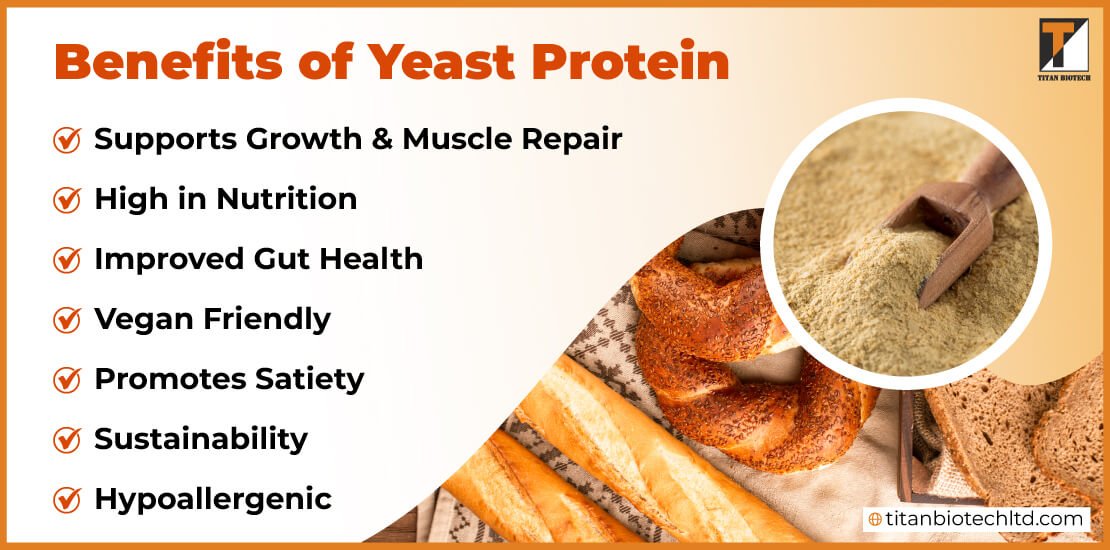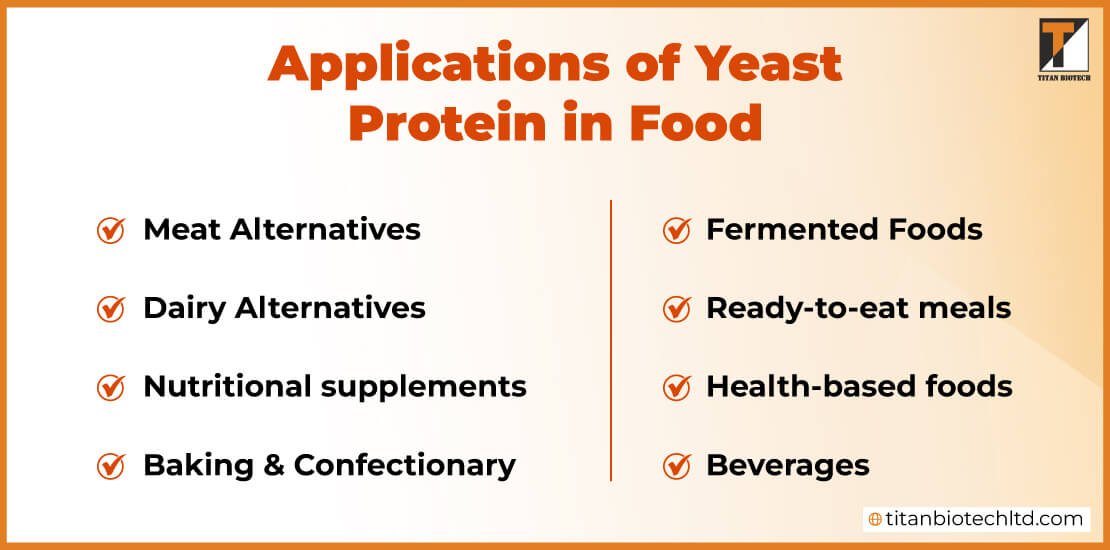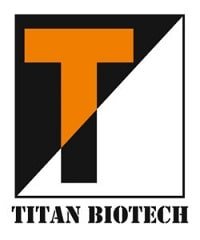Table of Content
- Nutritional Yeast Protein: Yeast as a Protein Source
- Benefits of Yeast Protein
- Applications of Yeast Protein in Food
- Quick Facts about Yeast Protein
- Conclusion
- Titan Biotech Limited- Leading Manufacturer & Exporter of Yeast Protein Powder
- References
People worldwide are becoming health-conscious and demand sustainable, healthy nutraceutical formulations and healthy food options. Nutritional Yeast protein plays a key role here as it is a complete protein source and fulfils the requirement of almost all essential amino acids. One of the critical benefits of yeast protein powder is that it is GMO-free, which makes it safe for human consumption.
Yeast Protein is a fermented and nutritious vegan protein source derived from yeast. It has almost all the essential amino acids required to maintain human health. You might know that amino acids play an important role in the growth and repair of bones, muscles and tissues and are the fundamental building blocks of proteins.
Nutritional Yeast Protein: Yeast as a Protein Source
Yeast Protein contains around 80% premium-quality protein. It is a slow-digesting protein that provides a continuous amino acid supply with sustained release. Moreover, it also contains functional polysaccharides that are important for gut health. Yeast protein is better than plant proteins in terms of taste and reduced production costs. Hence, these attributes make yeast protein perfect for consumers looking for alternative animal protein options.
Yeast protein powder is a high-quality protein source with high bioavailability that is extracted from the fermentation process. It is a rich protein source for vegetarians and is free from allergens and elements associated with animals.
Benefits of Yeast Protein

- Supports Growth & Muscle Repair – Yeast protein is rich in BCAA and plays a vital role in muscle development and post-exercise recovery.
- High in Nutrition – It is rich in B Vitamins and minerals like phosphorus, potassium, zinc, iron, and magnesium.
- Improved Gut Health – It has prebiotic effects that increase digestion and help maintain beneficial gut health.
- Vegan Friendly is a complete protein source and the perfect alternative for vegans.
- Promotes Satiety – Yeast protein results in slow digestion and helps manage weight.
- Sustainability – Yeast is grown rapidly in controlled environments and requires less water, land and other resources. Also, yeast protein is environment- friendly resulting in the conservation of natural resources and decreased greenhouse emissions.
- Hypoallergenic – Yeast Protein is the perfect choice for people with allergies to proteins like dairy, nuts, and soy. Moreover, the yeast protein amino acid profile and high digestibility support muscle repair and growth.
It is an excellent option for animal protein sources and provide a complete profile of essential amino acids without affecting the environment, making it the ideal option for vegans.
Applications of Yeast Protein in Food

Yeast Protein has become a versatile and sustainable protein source across the food industry. Here are some of the applications in the food industry that are discussed below:
-
Meat Alternatives
Yeast Protein can be added to meat alternative products to improve texture and flavour. It is a perfect option for vegan products.
-
Dairy Alternatives
It can also produce yoghurt and dairy-free cheese as it increases the mouthfeel and texture of these products.
-
Nutritional supplements
Yeast protein is rich in essential amino acids, making it a vital ingredient for shakes, bars and protein supplements. It is suitable for non-animal-based protein sources.
-
Baking & Confectionary
Yeast protein can increase the protein content of baked goods such as bread and pastries without compromising texture or taste. It is widely used in cakes, bread and pastries.
-
Fermented Foods
Yeast protein powder, rich in protein, can be added to seasoning, sauces, and soups to enhance the umami flavour of dishes. It also improves the savoury taste of dishes.
-
Ready-to-eat meals
Yeast protein can be incorporated into soups, snacks, and meals for increased protein content and nutrition. Hence, this is one of the best options for health-conscious customers.
-
Health-based foods
Yeast protein is used in various functional foods to improve health outcomes such as muscle recovery, weight management, and wellness.
-
Beverages
Yeast protein may also be added to drinks, smoothies, and other beverages to increase their protein content. It is pretty beneficial for fitness enthusiasts and athletes.
Quick Facts about Yeast Protein
- Yeast is a microorganism widely used in food and beverages. It is produced by the fermentation process, during which protein is separated and concentrated.
- It can be easily used in product formulations associated with food and has a neutral taste.
- Yeast protein has all the essential amino acids with a high content of lysine and leucine.
- Yeast protein has a PDCA (Protein Digestibility Corrected Amino Acid score) of 1, which indicates pretty good digestibility.
- Yeast can be added to vegan products like cheese or meat substitutes.
Conclusion
Yeast Protein Powder is a sustainable and versatile ingredient with broader applications in the food industry. It increases texture, nutrition, and flavours in various foods, from protein-enriched beverages to plant-based meat alternatives. The demand for yeast protein powder is increasing due to the development of nutritious, innovative, sustainable food products.
Titan Biotech Limited- Leading Manufacturer & Exporter of Yeast Protein Powder
Titan Biotech LTD. manufactures and markets raw material ingredients. It is a leading manufacturer and exporter of nutraceuticals, pharmaceuticals, food, beverage products and animal nutrition. With over 32 years of experience and a presence in 100+ countries, we have over 2000 happy customers.
Call or write to us if you require top-quality Yeast protein powder. Our experts will contact you as soon as possible.
References:
- https://www.sciencedirect.com/science/article/abs/pii/S0924224423001139
- https://www.ncbi.nlm.nih.gov/pmc/articles/PMC8780597/

